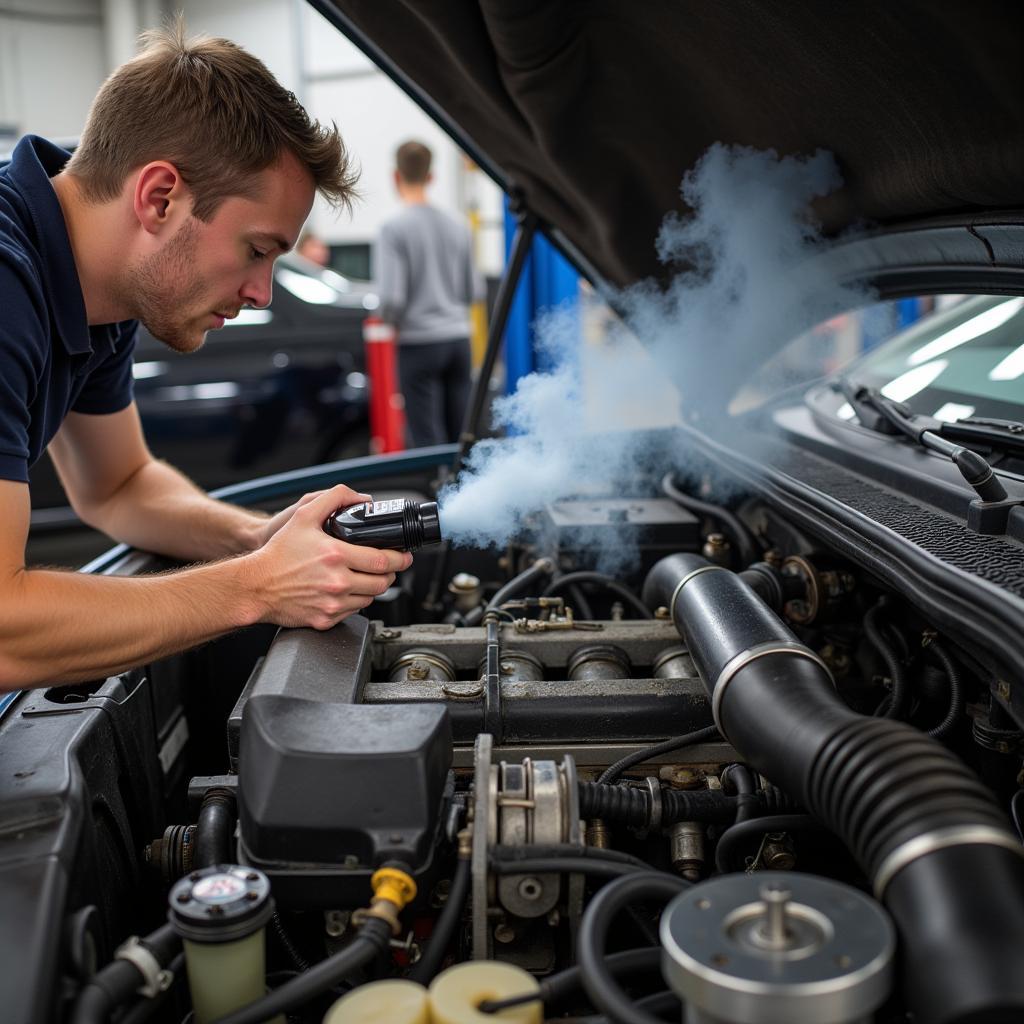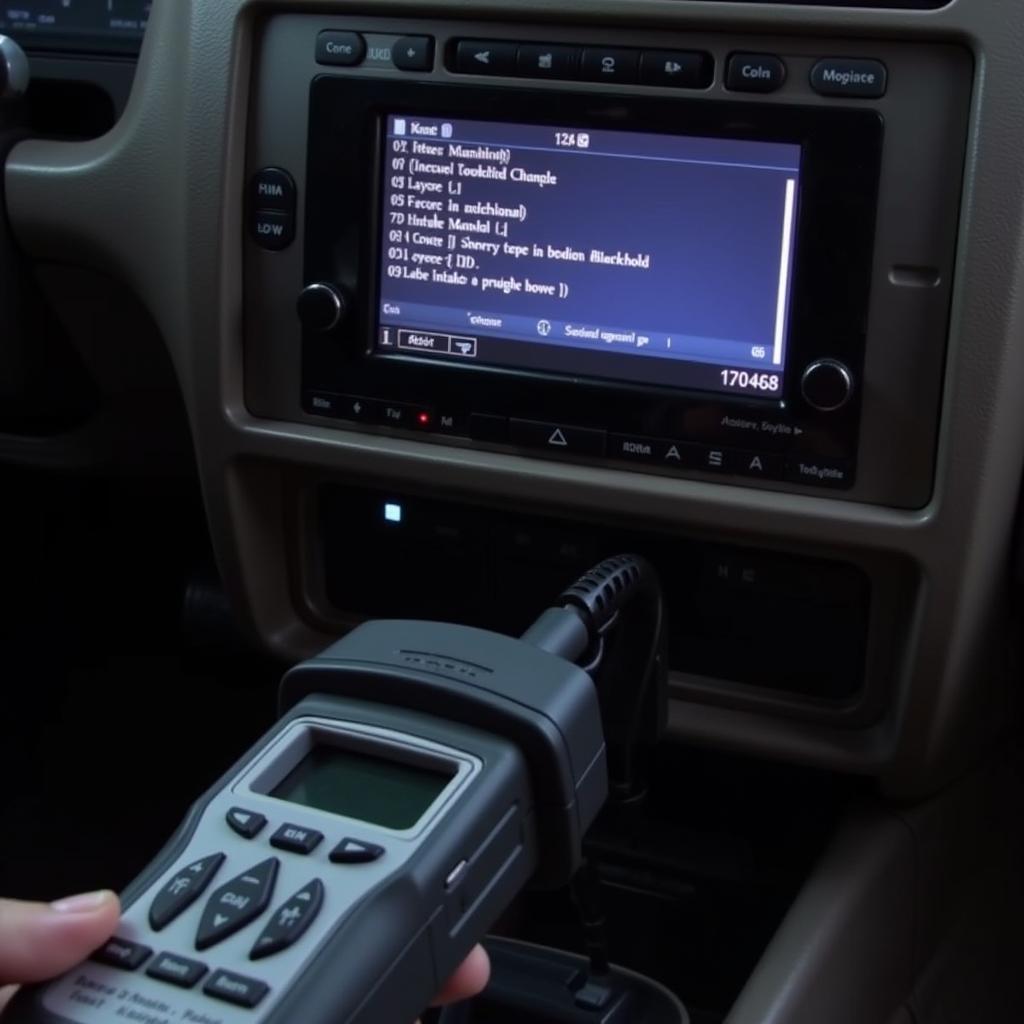The Lincoln Town Car, known for its luxurious ride and powerful engine, can sometimes experience intake manifold issues. These problems can range from minor vacuum leaks to major component failures, impacting performance and drivability. Understanding the common Lincoln Town Car Intake Manifold Problems, their symptoms, and solutions is crucial for both owners and mechanics. This guide aims to provide a comprehensive overview of these issues, enabling you to diagnose and address them effectively. We’ll explore common causes, diagnostic steps, and repair options for your Lincoln Town Car.
The intake manifold plays a vital role in your Lincoln Town Car’s engine performance. It distributes the air-fuel mixture to the cylinders, ensuring proper combustion. When the intake manifold malfunctions, it can lead to a variety of problems, affecting fuel efficiency, power output, and overall engine health. Addressing these issues promptly is crucial to maintaining optimal vehicle performance and preventing further damage. Are you experiencing rough idling, decreased fuel economy, or the dreaded check engine light? Your Lincoln Town Car’s intake manifold could be the culprit. Let’s dive into the details.
Common Lincoln Town Car Intake Manifold Problems
Several issues can plague the intake manifold in a Lincoln Town Car. Some of the most common include:
- Vacuum Leaks: These leaks can disrupt the air-fuel mixture, leading to rough idling, poor fuel economy, and hesitation during acceleration.
- Cracked Manifold: Over time, the intake manifold can develop cracks due to heat and stress. This can lead to significant vacuum leaks and performance issues.
- Failed EGR Valve: The Exhaust Gas Recirculation (EGR) valve, often integrated into the intake manifold, can fail and cause rough idling, stalling, and increased emissions.
- Faulty Intake Manifold Runner Control (IMRC) Solenoids: These solenoids control the airflow within the intake manifold. If they malfunction, it can lead to reduced power and performance.
- Warped or Damaged Gaskets: Leaking gaskets can cause similar symptoms to vacuum leaks, affecting the engine’s air-fuel ratio.
 Lincoln Town Car Intake Manifold Vacuum Leak Detection
Lincoln Town Car Intake Manifold Vacuum Leak Detection
Diagnosing Intake Manifold Problems
Identifying the specific issue requires careful diagnosis. Here are some steps to take:
- Visual Inspection: Check the intake manifold for visible cracks, loose connections, or damaged gaskets.
- Vacuum Test: Use a vacuum gauge to check for leaks. A fluctuating or low vacuum reading can indicate a problem.
- Smoke Test: A smoke test can pinpoint the location of vacuum leaks.
- Check Engine Light Codes: Retrieve any stored Diagnostic Trouble Codes (DTCs) using an OBD-II scanner. These codes can provide valuable clues.
 Lincoln Town Car OBD-II Scanner Diagnostic
Lincoln Town Car OBD-II Scanner Diagnostic
Repairing Intake Manifold Problems
Depending on the specific issue, repairs can range from simple fixes to more complex procedures.
- Replacing Gaskets: Leaking gaskets can be easily replaced.
- Repairing Cracks: Minor cracks can sometimes be repaired with epoxy or sealant. However, significant cracks often require manifold replacement.
- Replacing the EGR Valve: A faulty EGR valve typically needs to be replaced.
- Replacing IMRC Solenoids: Malfunctioning solenoids should be replaced.
- Replacing the Intake Manifold: In cases of severe damage or extensive cracking, replacing the entire intake manifold might be necessary.
How can I prevent intake manifold problems in my Lincoln Town Car?
Regular maintenance is key. Ensure all vacuum hoses are in good condition and check for leaks periodically. Addressing minor issues promptly can prevent them from escalating into major problems. Additionally, using quality fuel and adhering to recommended service intervals can contribute to the longevity of your intake manifold.
1997 lincoln town car hard starting problems
What are the symptoms of a bad intake manifold gasket?
Symptoms of a bad intake manifold gasket often mimic those of a vacuum leak, including rough idling, decreased fuel economy, and hesitation. A noticeable hissing sound coming from the engine bay can also indicate a gasket leak.
“A well-maintained intake manifold is crucial for optimal engine performance,” says John Miller, a seasoned automotive technician with over 20 years of experience. “Addressing issues early on can save you time and money in the long run.”
Conclusion
Lincoln Town Car intake manifold problems can significantly impact your vehicle’s performance and reliability. By understanding the common issues, diagnostic procedures, and repair options, you can effectively address these problems and keep your Town Car running smoothly. Don’t hesitate to contact us at AutoTipPro for assistance with your Lincoln Town Car’s intake manifold problems. We’re here to help! Our phone number is +1 (641) 206-8880 and our office is located at 500 N St Mary’s St, San Antonio, TX 78205, United States.
“Regular inspections and prompt repairs are essential for preventing costly intake manifold failures,” adds Sarah Chen, a certified mechanic specializing in Lincoln vehicles. “Don’t underestimate the importance of a properly functioning intake system for your car’s overall health.”
FAQ
-
What is the function of the intake manifold? The intake manifold distributes the air-fuel mixture to the engine cylinders.
-
How much does it cost to replace an intake manifold? The cost varies depending on the vehicle and the specific part required.
-
Can I drive with a cracked intake manifold? While you might be able to drive short distances, it’s not recommended. A cracked manifold can lead to further engine damage.
1997 lincoln town car hard starting problems
-
How do I know if my EGR valve is bad? Symptoms of a bad EGR valve include rough idling, stalling, and increased emissions.
-
What are the signs of a vacuum leak in the intake manifold? Common signs include rough idling, hissing sounds, and decreased fuel economy.
-
Can I fix a vacuum leak myself? Depending on the location and severity of the leak, you might be able to fix it yourself. However, it’s often best to consult a qualified mechanic.
-
How often should I check my intake manifold? It’s a good idea to have your intake manifold inspected during regular maintenance checks.





Leave a Reply